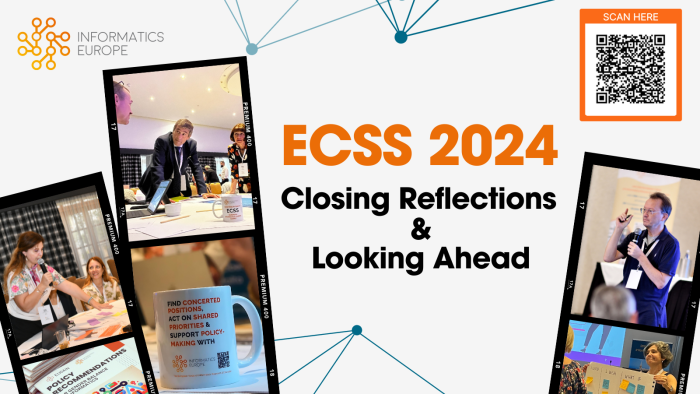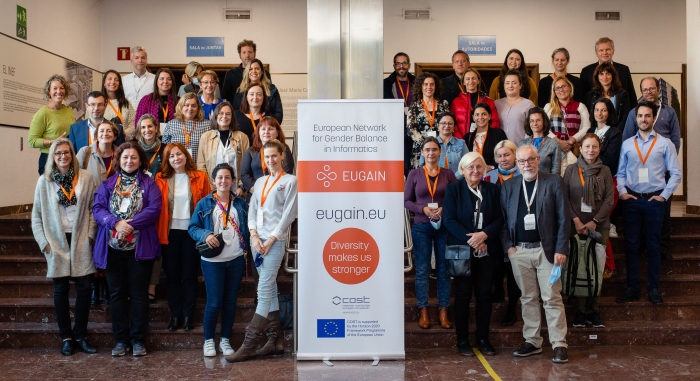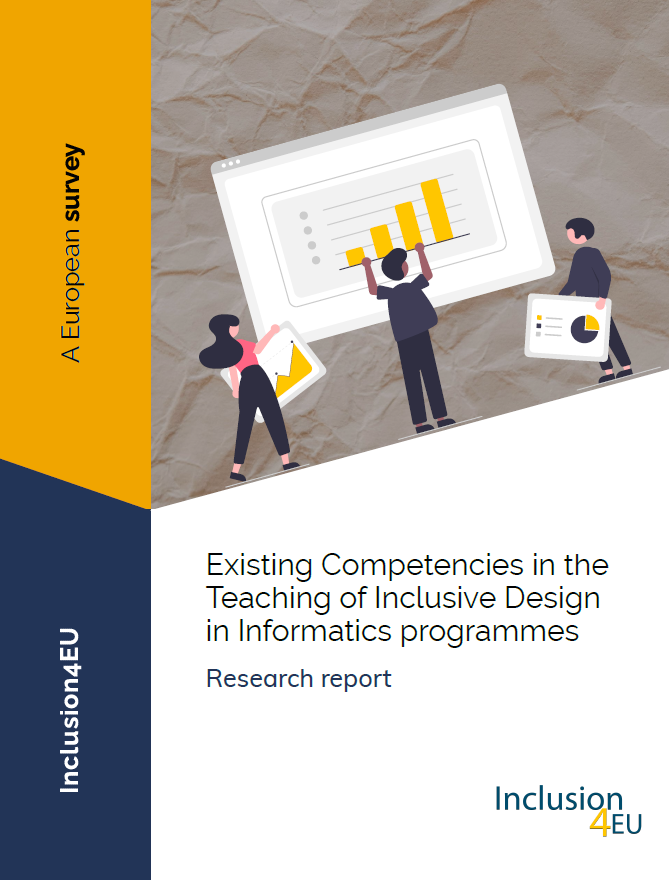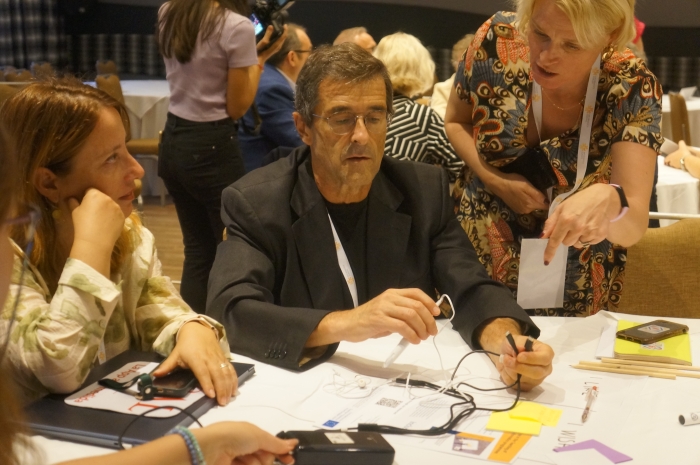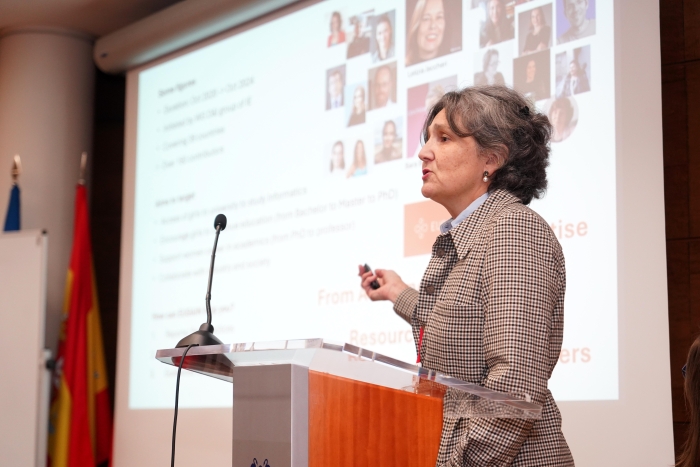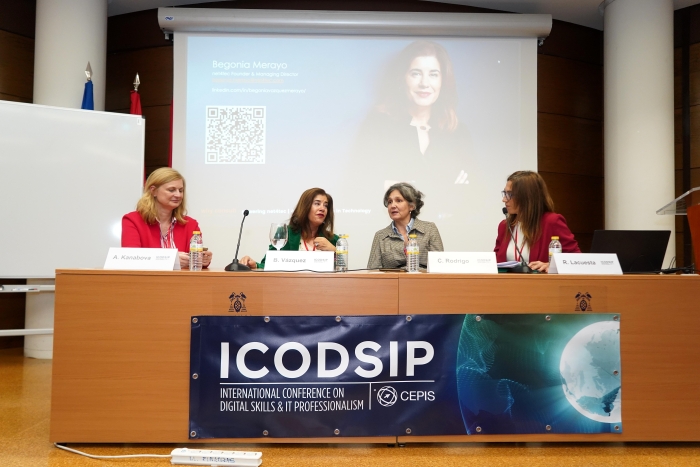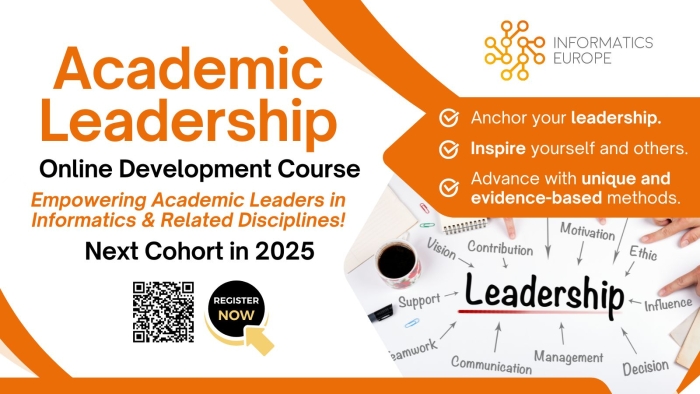Informatics Europe Bulletin: Concluding 2024, EU Projects & Looking Ahead
|
|
||
|
In this issue:
ECSS 2024 wrap-up and vision aheadAs we conclude ECSS 2024, marking the 20th European Informatics Leaders Summit, we reflect on two decades of collective achievements in strengthening the community, fostering collaboration and shaping policies for Informatics research and education advancement in Europe. This milestone is a testament to the shared vision we uphold.
We extend our heartfelt thanks to all ECSS 2024 participants for their engagement and insightful feedback. Building on the fruitful discussions at the Summit, several impactful publications are anticipated in 2025, addressing topics such as research evaluation, interdisciplinary collaboration, academia-industry partnerships or Green ICT metrics. Read our full ECSS 2024 closing statement and highlights of the different summit sessions here. Let us keep working on common goals, fostering meaningful policies and raising the voice of European Informatics education and research across Europe and beyond. Mark your calendar for ECSS 2025: October 27–29 in Rennes, France – see you there! Best Dissertation Award & Minerva Informatics Equality Awards 2024 resultsAs a tradition, the annual IE awards were presented to the winners at the ECSS 2024 Award Ceremony, followed by their engaging presentations.
The Award Committee also recognized two exceptional dissertations as runners-up:
Minerva Informatics Equality Award 2024, sponsored by Google:
Two remarkable initiatives were also recognized as runners-up:
Explore the winning dissertations and initiatives from their presentations here. The collection of past winners and best practices are also available on the Best Dissertation Award website and the Best Practices in Supporting Women website. Honoring Bara Buhnova: IE dedicates EUGAIN’s success to her legacyInformatics Europe marks the successful conclusion of the EUGAIN project (European Network for Gender Balance in Informatics), a COST Action that received an excellent evaluation from European Commission experts for its contributions to advancing gender balance in Informatics across Europe.
In remembering Bara, we would also like to extend our heartfelt gratitude to all EUGAIN contributors, including EUGAIN Chair Professor Letizia Jaccheri (NTNU, Norway) and our former WIRE Working Group (now the Diversity and Inclusion Working Group), whose dedication continues to inspire. EUGAIN’s achievements reflect the collective dedication of all contributors and stand as a tribute to Bara’s passion for Informatics research and education. We remain committed to advancing the shared mission of greater gender diversity in Informatics. Inclusion4EU: 2024 research reports and resources onlineInclusion4EU, an impactful Erasmus+ project, made notable progress in 2024. As one of the project partners, Informatics Europe is proud of its achievements in transforming software development by promoting inclusive design practices.
This year, Inclusion4EU published two research reports highlighting how software systems and organizations can foster inclusivity or perpetuate exclusion. Findings from a survey of 35 universities across 22 European countries on teaching inclusive design in Informatics programs were presented at ECSS 2024’s “Cultivating Diversity: Integrating Inclusiveness into Informatics Education” Workshop. The team also led an interactive session where participants assessed assistive technologies and co-designed solutions to enhance their inclusive usability and functionality.
Currently, Inclusion4EU is developing an Inclusion Charter to help organizations adopt co-design principles, developed through collaborative sessions with academics, industry professionals, and citizens. The project’s final phase will introduce a training program for academics and Informatics professionals on facilitating co-design sessions. IE at CEPIS’s 1st International Conference on Digital Skills and IT ProfessionalismInformatics Europe proudly supported the first International Conference on Digital Skills and IT Professionalism (ICODSIP 2024), co-organised by our sister organisation CEPIS, the Council of European Professional Informatics Societies.
Covadonga highlighted the results achieved in EUGAIN, IE's recently concluded COST Action, showcasing the provision of open resources to foster women's participation, continuing education and careers in IT. She also encouraged ongoing efforts to promote gender diversity in IT, including awareness raising and the inclusion of certification policies.
The panel emphasized the critical need for campaigns and initiatives that offer activities and grants to spark interest in Informatics from an early age, starting in pre-teen years or schools. This is particularly important as the involvement of Informatics faculties in Europe in promoting women’s inclusion remains limited. The conference shows that progress in Informatics education and research relies on embracing diverse perspectives. Become IE’s Working Group members to join forces with experts and drive meaningful impact in Informatics at the European level. DIGHUM Workshop 2024 HighlightsOn November 28 and 29, IE member institute TU Wien Informatics and the Institute for Human Sciences (IWM) hosted a multidisciplinary workshop to explore the future of Informatics. The two-day event focused on a potential Paradigm Shift in the field, transitioning from logic and algorithmic certainty to probability and large language models (LLMs). Prof. Enrico Nardelli (Università di Roma "Tor Vergata", Italy), current IE Board Director and former President, along with former IE President Prof. Lynda Hardman (CWI / Utrecht University, the Netherlands), contributed as panellist for Nov 28th’s “History of AI” session. New 2025 cohort: Academic Leadership Development Online CourseEffective leadership is essential for creating environments where researchers can excel, yet many academics lack access to tailored training opportunities.
Join the 7th Academic Leadership Development Online Course in May 2025 — a transformative course designed specifically for academics in Informatics and related fields. Led by leadership experts Prof. Geraldine Fitzpatrick and Prof. Austen Rainer, this program offers practical strategies and evidence-based tools to strengthen your leadership, self-awareness, and team performance. New IE membersWe are pleased to welcome the following new members:
They joined a growing IE membership of nearly 200 informatics academic institutions, national associations, companies and research centers from over 30 countries. Check out our current members list. Events by IE members
IE member newsAI-SPRINT presented by HaDEA as a success case at Web Summit 2024 - Politecnico Milano, ItalyThe AI-SPRINT research project, coordinated by Prof. Danilo Ardagna from the Department of Electronics, Information and Bioengineering, was showcased as a successful case by the European Health and Digital Executive Agency (HaDEA) at Web Summit 2024. This Summit, one of the largest technology conferences globally, gathered over 70,000 participants to promote networking and idea exchange. AI-SPRINT's key outcome is an innovative framework for AI applications that ensures data privacy and security by leveraging a continuum of computing resources from the cloud to the edge. This framework can provide tools to optimise the runtime of AI applications, improving their flexibility, scalability and energy efficiency. The project also supported European software houses and cloud providers, fostering new opportunities in AI and edge computing ecosystems. Full news here. ZHAW involved in EU project DataGEMS: A data discovery platform to benefit business and society – Zurich University of Applied Sciences, SwitzerlandResearchers from the ZHAW Institute of Computer Science (InIT) are contributing to the EU DataGEMS project, which seeks to create a cutting-edge platform for data discovery, management, and analysis. Centered on FAIR principles and data reusability, this project aims to deliver an intuitive solution for use in science, business, and society. Read more here. Inside Sheffield’s Indoor Urban Farm – University of Sheffield, UKMeet Future Greens – a team of University of Sheffield alumni, including a co-founder from the University’s School of Computer Science, on a mission to transform farming with their urban vertical farm. Watch the YouTube video here showcasing this innovative multidisciplinary project where Informatics plays a key role in developing resilient urban solutions. |
||
|
About the Bulletin For changes, please contact administration@informatics-europe.org. Copyright © 2025 Informatics Europe. All rights reserved.
|
||
